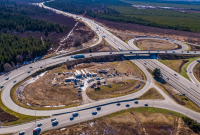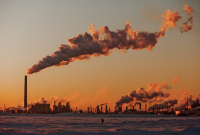Support strong Canadian climate journalism for 2025
The Canadian government’s recent COVID-19 initiative for the gas and oil industry may signal Ottawa has reached a turning point and is responding to public pressure to address the climate crisis, noted environmentalist Tzeporah Berman says.
The federal government will spend a combined $2.5 billion to clean up thousands of contaminated oil and gas wells in British Columbia, Alberta and Saskatchewan and to cut a potent form of carbon pollution, Prime Minister Justin Trudeau announced April 17.
“I think this decision, this bailout package, was a shot across the bow of the oil industry,” said Berman, international program director for Stand.earth.
Ottawa is getting the message voters want climate change to be a priority, Berman told 500 participants on a Zoom event hosted by Canada's National Observer Editor-in-Chief Linda Solomon Wood last week.
“It’s a recognition that we need to spend as much, if not more effort, supporting other industries that are truly cleaner and safer,” Berman added.
The environmental activist and campaigner, who is based in B.C. and lives part-time on Cortes Island, was discussing fossil fuel industry bailouts and how COVID-19 might open new possibilities to establish a green economy.
Trudeau’s stated goals for the oil and gas COVID-19 initiative was to support industry workers and their families, and help fossil fuel companies avoid bankruptcy, while meeting his government’s environmental objectives.
The federal government resisted enormous pressure from the oil and gas industry to roll back environmental regulation, Berman said, referencing a leaked memo obtained by Environmental Defence.
Additionally, the Alberta government wants Ottawa to provide cash bailouts of $30 billion to $40 billion to the fossil fuel sector to help companies survive the staggering price collapses caused by the COVID-19 global pandemic.
“I was really glad to see that (the federal government) didn’t cave … to those incredibly outrageous demands, because quite frankly ... we have seen them cave in the past,” Berman said, referring to the Liberal government’s $4.5-billion buyout of Kinder Morgan’s struggling Trans Mountain pipeline.
Environmental policy crossroad
“I think it’s a turning point for politics in Canada … where we acknowledge the incredible mess that does need to be cleaned up,” Berman said.
A second indicator Ottawa is shifting ground around the environment is the decision not to proceed with the Teck Frontier oilsands project, Berman said.
That decision was due to the fact the federal government faced massive opposition to the project from the public and environmental scientists, she said.
“Teck pulled out because they knew they weren’t going to get the decision they wanted,” Berman said. “Our governments are listening. They will respond and prioritize, in part, what they think voters are prioritizing.”
Taxpayers footing oilwell cleanup bill
However, Berman stressed, taxpayers shouldn’t be paying to clean up the dregs left behind by the oil and gas sector.
There are 6,000 orphan wells and 90,000 inactive wells that could fall into that category across B.C., Alberta and Saskatchewan, said Berman.
Abandoned wells can leak pollutants such methane, brine or heavy metals and can contaminate groundwater, surrounding land or the atmosphere.
Estimates to clean up the well problem range between $70 billion and $200 billion, Berman said.
“So that’s a strategy, get all the oil out, make the profits … go bankrupt and leave the cleanup to taxpayers,” she said. “So, should taxpayers' dollars be going to pay for the mess the industry left behind? Actually no. Regulations and laws and policy should make sure we’re not left this mess.”
But, the federal decision to contribute to the cleanup of wells has led to increased awareness about the problem, Berman noted.
“The interesting thing is this decision really elevated in public consciousness and in politics in Canada … that our laws lag behind other jurisdictions,” she said.
North Dakota, California and Texas all have limits for how long a well can be inactive before being cleaned up, Berman said.
Setting limits on how long a well can be inactive and requiring companies to post bonds, or pay money up front, for their cleanup would solve future problems in Canada, she added.
Canada’s environmental disconnect
Despite Canada's preferred self-image as a green leader with talk about national carbon pricing and the phase out of coal, the country is actually increasing oil and gas production, and its carbon pollution is going up according to the latest national greenhouse gas inventory report, Berman observed.
“Oil and gas production is now the single largest component of Canada’s emissions and the fastest-growing,” Berman said.
The math simply doesn’t add up for Canada to reach its stated goal of net-zero emissions by 2050, she added.
Even before the COVID-19 crisis and its attendant plunge in oil prices, the oil and gas industry was facing record bankruptcies, with Canada's sector being in more trouble than most, Berman said.
Now is the moment to diversify the Canadian economy and to wind down and end oil and gas production to meet the government’s 2050 goals, she said.
“The oil industry is never going to go back to those big boom days. … COVID-19, the price drop, and climate action around the world have changed oil demand forever,” Berman stressed.
“What we decide to build with these new stimulus and bailout packages will decide what our economy looks like and also whether or not we have a stable climate.”
It’s vital that Canada begins to align its energy projects with its climate targets, said Berman, referring to the federal government’s support of pipelines.
“It’s like the right hand isn’t talking to the left hand right now. We have a climate plan, and then over here, we have infrastructure and project development and that’s not being led by our climate priorities.”
Plan for fossil fuel wind down
Canada isn’t going to stop using fossil fuels overnight, but there’s enough supply and above-ground storage to meet demand during the wind down, especially if efficiency measures focused on electrified and renewables systems are put in place, Berman said.
“We need to acknowledge as a nation that we can not expand it. No new projects whatsoever,” she said.
Planning for the decline of the oil and gas industry would ease turmoil at an economic and individual level, Berman said.
“If we do that, then there will be fewer casualties. Then we can ensure we’re retraining people and that we’re leaving no one behind,” she said. “It’s going to happen by design or default.”
Berman said the pandemic has demonstrated what government and the public can achieve if everyone acts collectively and listens to the science.
“I heard somebody say it’s like we are in a zero-gravity moment. And when we land, things will be different,” she said. “I think it has given us all time to reflect on what kind of economy we want in the future.”
Rochelle Baker / Local Journalism Initiative






Comments
Berman: "The Canadian government’s recent COVID-19 initiative for the gas and oil industry may signal Ottawa has reached a turning point and is responding to public pressure to address the climate crisis."
I hope Berman is right, but somehow I doubt it. This is the same Liberal Govt that declared a climate emergency one day and approved the TMX pipeline the next. Who can take Trudeau seriously?
The Trudeau govt also gave its blessing to B.C.'s LNG industry. Trudeau adopted Stephen Harper's inadequate targets but so far shows no intention of meeting them.
Does anybody expect the most powerful industry on the planet to go gently into that good night?
Oilsands boosters rage, rage against the dying of the light.
How does this neoliberal handout for well cleanup differ from previous subsidies?
How does this — the third and surely not the last in a series of handouts for well cleanup — signify the "end of business as usual" and "winding down the oil and gas industry"?
A blatant violation of the polluter-pay principle.
The industry has been digging into taxpayers' pockets for reclamation and cleanup costs for over a decade.
In 2009 Stephen Harper gave the oil industry a $30 million handout to clean up orphan wells.
In 2016, the oilfield service lobby asked for half a billion federal dollars to clean up old wells. Ottawa declined. In the end, the AB Govt issued a $235-million loan to the Orphan Well Association, with interest covered by Ottawa. So far taxpayers are on the hook for at least $30 million.
Trudeau has just added $1.7 billion to that total.
Taxpayer support for the oil industry should be
a) zero
and otherwise b) conditional to make sure that this latest clean-up subsidy is the last:
1) CAPP ceases all efforts to roll back or delay environmental regulations and oppose new protection measures.
2) Oil & gas companies must post bonds upfront to cover well cleanup and remediate all wells under strict timelines.
Yes you're right - repeated inaction from the O&G sector indicates Govt. needs to exert more conditions/control on taxpayers' money they dole out, as well as enforce those conditions. The oil industry has had free rein to pollute our threatened biosphere for too long, with CALAMITOUS results for future life on this planet..
And to clarify for any irrelevant 'denial' POVs, aLL references made to 'CLIMATE' can be expanded to mean Earth's BIOSPHERE & HEALTH THEREOF -- which, based on the most respected & unbiased scientific research, is on a dangerously downward spiral unless we restore Nature's ecosystems/functions & DRASTICALLY REDUCE OUR GHG EMISSIONS! (BTW, when was 2020 changed to 2050 as the NetZero goal??) Here's GENUS CAPITAL MGMT's detailed explanation of Climate Change & fossil fuels' majority role therein.. + what needs to be done NOW..
https://drive.google.com/open?id=18JtoP7538hHORSINkj_Gb8hYsrhsxONW
Jason Kenney is using the moral argument that Fort McMurray deserves federal assistance in this current flooding caused by ice jams. The argument he uses is the ‘contribution to prosperity’ card. Hmmm?
Now, the good people of Fort Mac deserve rescue for sure. Because they are Canadian. Period.
jason KKKenney actually said,"you owe us" in the CBC radio news today re the feds paying to stop flooding in Ft Mac. Where's his proud, independent, "F off Ottawa and let us do things our way" stance when money is required to serve his own people in his own Wexity Albertard province.
Ah yes, offload all actual service to the people costs to the feds and whine they never appreciate your contribution (to destroying all land water and air in the north of Alberta for the benefit of texas oil barons...)
It's near the tipping point where good public money falling into holes in the ground will never be seen again. Crude at today's low or negative return will never bubble up into profitability for anyone. And the hope that demand will rise again to its former glory is getting pretty wispy.
Sure, today's glut will drain significantly over the coming year or two, and prices may see a rise on the daily display of market monitor screens. But long term? Better look at bonds, GICs and renewables instead.
Olivier Jakob, the Swiss analyst with Petro Matrix, said with reasonable assurance in a recent interview with the Globe's Eric Reguly that "Oil demand has not peaked yet, but demand growth has peaked. The energy transition away from oil is a reality that will not reverse."
He also believes that the long-term easing of demand growth in oil due to transitions to low-carbon economies will help avoid global shortages of oil and major price fluctuations, outside of price wars. That said, the EU and China are moving away from the internal combustion engine and will therein see less revenue from gas taxes, ergo higher taxes and overall prices.
Britain recently announced they are doing away with gasoline, diesel and hybrid vehicles by 2035. BC's NDP government has a similar policy, but it's set for 80% electric vehicles by 2040. Though these dates are much too far off for the average climate scientist, they indicate that a transition away from oil is well underway in many disparate jurisdictions.
Alberta under its current and previous leadership subscribes without question to the CAPP Scientific Method. This has clouded their vision of simple economics and international markets, and fostered an unseemly tendency toward issuing propaganda as a defence mechanism. In essence, a great day of reckoning will occur there sometime in the next handful of fiscal cycles, no doubt accompanied by much wailing and gnashing of teeth with the dawning certain knowledge that their phenomenal inheritance was blown and there is little to show for it after decades of industry influence over government.
Canadians need to awaken from their long slumber and get on with the Plan. That is, a National Transition Plan. Alberta will be either a willing or unwilling partner in that Plan, it's their choice to make. No government or bureaucracy yet has indicated it has any idea what that plan would look like. So, we can conclude that it's up to us to draw one up, at least a draft.
Right hand isn't talking to the left hand? Tzeporah my dear, hands don't talk. Lol.